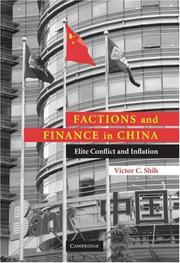
ISBN: 9780521106474 9780521872577 9780511790591 9780511367618 0511367619 9780511366390 0511366396 0511790597 052187257X 1107180767 9781107180765 1281146234 9781281146236 9786611146238 6611146237 0511367023 9780511367021 0511365764 9780511365768 0511573723 9780511573729 0521106478 Year: 2008 Publisher: Cambridge ; New York : Cambridge University Press,
Abstract | Keywords | Export | Availability | Bookmark
 Loading...
Loading...Choose an application
- Reference Manager
- EndNote
- RefWorks (Direct export to RefWorks)
The contemporary Chinese financial system encapsulates two possible futures for China's economy. On the one hand, extremely rapid financial deepening accompanied by relatively stable prices are both manifestations of a vigorous growth trajectory that will one day make China the world's largest economy. On the other hand, the colossal store of non-performing loans in the banking sector augurs a troubling future. Factions and Finance in China inquires how elite factional politics has given rise to both of these outcomes since the reform in 1978. The competition between generalists in the Chinese Communist Party and politically engaged technocrats over monetary policies has time and time again prevented inflation from spinning out of control. Shih shows that elite politics has exerted a profound impact on monetary policies and banking institutions in contemporary China.
Banks and banking --- Finance --- Monetary policy --- Government policy --- China --- Politics and government. --- S10/0420 --- S10/0320 --- China: Economics, industry and commerce--Public finance and taxation: since 1949 --- China: Economics, industry and commerce--Money and banking: since 1949 --- Funding --- Funds --- Economics --- Currency question --- Agricultural banks --- Banking --- Banking industry --- Commercial banks --- Depository institutions --- Financial institutions --- Money --- Social Sciences --- Political Science
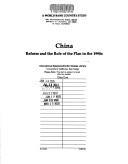
Abstract | Keywords | Export | Availability | Bookmark
 Loading...
Loading...Choose an application
- Reference Manager
- EndNote
- RefWorks (Direct export to RefWorks)
Central planning --- Economic forecasting --- S10/0251 --- S10/0420 --- S10/0520 --- S10/0805 --- China: Economics, industry and commerce--General works and economic history: since 1989 --- China: Economics, industry and commerce--Public finance and taxation: since 1949 --- China: Economics, industry and commerce--Industry: since 1949 --- China: Economics, industry and commerce--Transportation and communications: since 1949 --- China --- Economic policy --- Economic policy and planning (general)
Book
ISBN: 0333258622 0333258630 9780333258620 Year: 1978 Publisher: London: MacMillan,
Abstract | Keywords | Export | Availability | Bookmark
 Loading...
Loading...Choose an application
- Reference Manager
- EndNote
- RefWorks (Direct export to RefWorks)
Economic policy and planning (general) --- China --- S10/0240 --- S10/0320 --- S10/0420 --- S10/0430 --- 338.22 --- #SML: Joseph Spae --- finances --- commerce --- chine --- China: Economics, industry and commerce--General works and economic history: since 1949 --- China: Economics, industry and commerce--Money and banking: since 1949 --- China: Economics, industry and commerce--Public finance and taxation: since 1949 --- China: Economics, industry and commerce--Investment --- Economische organisatieleer. Economisch beleid. Economische politiek --- financien --- handel --- china --- 338.22 Economische organisatieleer. Economisch beleid. Economische politiek
Book
ISBN: 9780470825075 0470825073 Year: 2010 Publisher: Singapore Wiley
Abstract | Keywords | Export | Availability | Bookmark
 Loading...
Loading...Choose an application
- Reference Manager
- EndNote
- RefWorks (Direct export to RefWorks)
S10/0320 --- S10/0420 --- S10/0700 --- China: Economics, industry and commerce--Money and banking: since 1949 --- China: Economics, industry and commerce--Public finance and taxation: since 1949 --- China: Economics, industry and commerce--International economic relations (incl. development aid and problems, WTO) --- Global Financial Crisis, 2008-2009. --- Investments, Chinese --- China --- Economic conditions --- Economic policy --- Global Financial Crisis, 2008-2009 --- Chinese investments --- Global Economic Crisis, 2008-2009 --- Subprime Mortgage Crisis, 2008-2009 --- Financial crises
Book
ISBN: 0231173466 0231543263 9780231543262 9780231173469 Year: 2017 Publisher: New York : Columbia University Press,
Abstract | Keywords | Export | Availability | Bookmark
 Loading...
Loading...Choose an application
- Reference Manager
- EndNote
- RefWorks (Direct export to RefWorks)
Many of the world's major economies boast dominant international currencies. Not so for China. Its renminbi has lagged far behind the pound, the euro, and the dollar in global circulation-and for good reason. China has long privileged economic policies that have fueled development at the expense of the renminbi's growth, and it has become clear that the underpowered currency is threatening China's future. The nation's leaders now face the daunting task of strengthening the currency without losing control of the nation's economy or risking total collapse. How are they approaching this challenge?In The People's Money, Paola Subacchi introduces readers to China's monetary system, mapping its evolution over the past century and, particularly, its transformation since Deng Xiaoping took power in 1978. Subacchi revisits the policies that fostered the country's economic rise while at the same time purposefully creating a currency of little use beyond China's borders. She shows the key to understanding China's economic predicament lies in past and future strategies for the renminbi. The financial turbulence following the global crisis of 2008, coupled with China's ambitions as a global creditor and chief economic power, has forced the nation to reckon with the limited international circulation of the renminbi. Increasing the currency's reach will play a major role in securing China's future.
Foreign exchange --- Renminbi. --- Finance --- Monetary policy --- CNY (Money) --- Ren min bi --- RMB (Money) --- Yuan (Money) --- Money --- Cambistry --- Currency exchange --- Exchange, Foreign --- Foreign currency --- Foreign exchange problem --- Foreign money --- Forex --- FX (Finance) --- International exchange --- International finance --- Currency crises --- China --- Commerce. --- Renminbi --- E-books --- S10/0320 --- S10/0420 --- S10/0470 --- China: Economics, industry and commerce--Money and banking: since 1949 --- China: Economics, industry and commerce--Public finance and taxation: since 1949 --- China: Economics, industry and commerce--Commerce inside China: since 1949
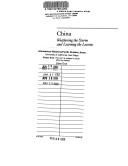
ISBN: 0821344862 Year: 1999 Publisher: Washington, D.C.
Abstract | Keywords | Export | Availability | Bookmark
 Loading...
Loading...Choose an application
- Reference Manager
- EndNote
- RefWorks (Direct export to RefWorks)
S10/0251 --- S10/0310 --- S10/0330 --- S10/0420 --- S10/0581 --- China: Economics, industry and commerce--General works and economic history: since 1989 --- China: Economics, industry and commerce--Money and banking: 1911 - 1949 --- China: Economics, industry and commerce--Employment --- China: Economics, industry and commerce--Public finance and taxation: since 1949 --- China: Economics, industry and commerce--Management of state enterprises --- China --- Economic conditions --- Social conditions --- Economic conditions. Economic development
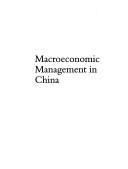
ISBN: 0821327224 Year: 1993 Publisher: Washington, D.C. The World Bank
Abstract | Keywords | Export | Availability | Bookmark
 Loading...
Loading...Choose an application
- Reference Manager
- EndNote
- RefWorks (Direct export to RefWorks)
S10/0251 --- S10/0320 --- S10/0420 --- S10/0470 --- S10/0590 --- China: Economics, industry and commerce--General works and economic history: since 1989 --- China: Economics, industry and commerce--Money and banking: since 1949 --- China: Economics, industry and commerce--Public finance and taxation: since 1949 --- China: Economics, industry and commerce--Commerce inside China: since 1949 --- China: Economics, industry and commerce--Distribution --- #A9404E --- China --- Economic conditions --- Economic policy --- Economic conditions. Economic development
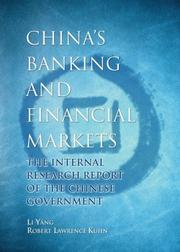
ISBN: 9780470822197 0470822198 Year: 2007 Publisher: Hoboken, N.J. Wiley
Abstract | Keywords | Export | Availability | Bookmark
 Loading...
Loading...Choose an application
- Reference Manager
- EndNote
- RefWorks (Direct export to RefWorks)
S10/0320 --- S10/0420 --- Banks and banking --- -Finance --- -Capital market --- -332.0951 --- Capital markets --- Market, Capital --- Finance --- Financial institutions --- Loans --- Money market --- Securities --- Crowding out (Economics) --- Efficient market theory --- Funding --- Funds --- Economics --- Currency question --- Agricultural banks --- Banking --- Banking industry --- Commercial banks --- Depository institutions --- Money --- China: Economics, industry and commerce--Money and banking: since 1949 --- China: Economics, industry and commerce--Public finance and taxation: since 1949 --- Money market. Capital market --- China --- -Money market. Capital market --- -Banks and banking
Book
ISBN: 9780801450624 9780801465512 0801465516 0801465958 9780801465956 0801450624 Year: 2012 Publisher: Ithaca
Abstract | Keywords | Export | Availability | Bookmark
 Loading...
Loading...Choose an application
- Reference Manager
- EndNote
- RefWorks (Direct export to RefWorks)
"The official banking institutions for rural China are Rural Credit Cooperatives (RCCs). Although these co-ops are mandated to support agricultural development among farm households, since 1980 half of RCC loans have gone to small and medium-sized industrial enterprises located in, and managed by, townships and villages. These township and village enterprises have experienced highly uneven levels of success, and by the end of the 1990s, half of all RCC loans were in or close to default, forcing China's central bank to bail out RCCs. In Prosper or Perish, Lynette H. Ong examines the bias in RCC lending patterns, focusing on why the mobilization of rural savings has contributed to successful industrial development in some locales but not in others"--Publisher's Web site.
Banks and banking, Cooperative --- Central-local government relations --- Local finance --- Rural credit --- Rural development --- S06/0225 --- S10/0320 --- S10/0420 --- S20/0260 --- Credit --- Cooperative banks --- Credit cooperatives --- People's banks --- Banks and banking --- Cooperative societies --- China: Politics and government--People's Republic: local and provincial government: since 1976 --- China: Economics, industry and commerce--Money and banking: since 1949 --- China: Economics, industry and commerce--Public finance and taxation: since 1949 --- China: Agriculture forestry, fishery, natural disasters--Peasant economy
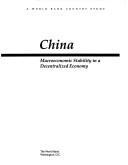
ISBN: 0821333275 Year: 1995 Publisher: Washington, D.C.
Abstract | Keywords | Export | Availability | Bookmark
 Loading...
Loading...Choose an application
- Reference Manager
- EndNote
- RefWorks (Direct export to RefWorks)
Budget deficits --- Decentralization in government --- Economic stabilization --- Inflation (Finance) --- Monetary policy --- S10/0251 --- S10/0320 --- S10/0420 --- Adjustment, Economic --- Business stabilization --- Economic adjustment --- Stabilization, Economic --- Economic policy --- Centralization in government --- Devolution in government --- Government centralization --- Government decentralization --- Government devolution --- Political science --- Central-local government relations --- Federal government --- Local government --- Public administration --- Deficits, Budget --- Budget --- Deficit financing --- China: Economics, industry and commerce--General works and economic history: since 1989 --- China: Economics, industry and commerce--Money and banking: since 1949 --- China: Economics, industry and commerce--Public finance and taxation: since 1949 --- China --- Economic conditions. Economic development

 Search
Search Feedback
Feedback About UniCat
About UniCat  Help
Help News
News